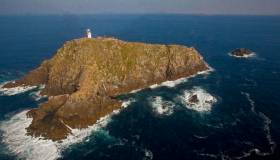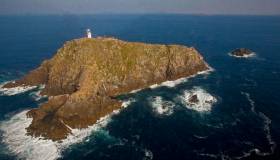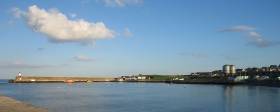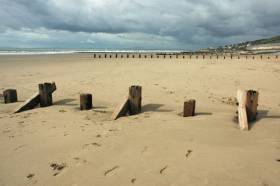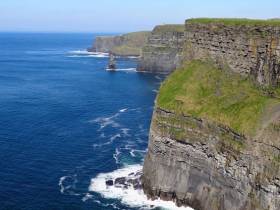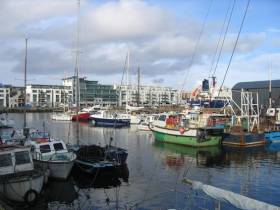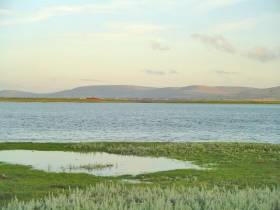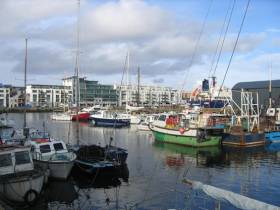Displaying items by tag: Search
#Rescue116 - More than 100 divers have joined a major search since early this morning (Saturday 22 April) for Paul Ormsby and Ciaran Smith, the two Irish Coast Guard crew members still missing after the Rescue 116 tragedy over a month ago.
According to The Irish Times, an exclusion zone around the wreck site at Black Rock off Co Mayo has been lifted for the search, thought to be the largest ever co-ordinated dive in the history of the State.
Naval Service and Garda divers are joined by specialists in sub-sea search and recovery in combing the sea bed of at the western and south-western parts of the island, following the completion of a ‘360-degree’ terrain survey by the Army and Garda crime scene examiners.
The Irish Times has much more on the story HERE.
#Rescue116 - The Coast Guard Rescue Coordination Centre in Malin will tomorrow (Saturday 8 April) assist with managing the surface search for the two missing crewmen of Rescue 116 by a large number of fishing vessels that have offered their services.
No trace of Paul Ormsby or Ciarán Smith was found when the wreck of the Sikorsky S-92 helicopter was lifted from the sea bed off Black Rock in Co Mayo last weekend, as previously reported on Afloat.ie.
While underwater operations are ongoing, a fleet of fishing vessels from Killybegs this week pledged to sweep the Atlantic seaboard from first light tomorrow for any sign of the missing coastguard airmen, according to The Irish Times.
The South Donegal and North Mayo coast has been divided into a number of search areas, each under the direction of an RNLI or Irish Coast Guard asset. The Naval Service ship LÉ Ciara will be on scene ready to assist where required.
Meanwhile, the coastguard is requesting all mariners in the area to keep a good lookout for any debris in the course of their routine activities and to report any findings to the Malin Head Coast Guard Coordination Centre.
Coastguard officials expressed their ongoing appreciation to the many volunteers supporting the search, in particular coastguard members, lifeboat volunteers and Civil Defence, as well as local community support.
Update from the RNLI: Lifeboats from Ballyglass, Achill, Sligo, Bundoran and Arranmore, along with Killybegs and Killala Coast Guard, will be on scene for the day and will keep in communication with all vessels.
The RNLI wishes to join with the coastguard in stressing the importance of safety for every person taking part in the search. Each individual should be wearing a personal floatation device and have access to a working VHF for communications.
While engaged in the search, the RNLI lifeboats will remain on call and available for search and rescue operations. Should an RNLI lifeboat need to respond to an emergency elsewhere a designated deputy vessel will be appointed.
Commenting on the planned search, RNLI lifesaving manager Gareth Morrison said: “Since the loss of Rescue 116 our lifeboat crews from Ballyglass and Achill, later joined by Arranmore, Sligo and Bundoran have spent a huge number of hours out searching. This has been in conjunction with our colleagues in the Irish Coast Guard, Naval Service, Civil Defence and with local vessels.
“Most of our lifeboat crew are volunteers who have left families and jobs to engage in the search. I want to take this opportunity to thank all the RNLI lifeboat crews, station personnel and wider communities who have taken part.”
“With everyone involved in the search on Saturday staying vigilant and safe and following the directions from the on scene coordinators we will cover a huge area safely. We also ask that people continue to keep a lookout for any debris and report findings to the coastguard.”
Morrison concluded: “Our thoughts remain with the families and colleagues of the crew of Rescue 116.”
Search For Missing Man In Wicklow Harbour
#Missing - RTÉ News reports on the ongoing search for a man in his 50s reported missing in Wicklow Harbour this morning (Tuesday 27 December).
Wicklow RNLI, the Irish Coast Guard and gardaí are all involved in the operation that began around 10.30am.
The news comes two just days after a man was rescued from the River Liffey in Dublin city centre on Christmas morning, as previously reported on Afloat.ie.
#Missing - BBC News reports that the search has resumed for two teenagers missing in the Irish Sea off north-west Wales since yesterday afternoon (Sunday 7 August).
The two boys, ages 14 and 15, had got into difficulty while swimming at Barmouth Beach in Cardigan Bay and were separated from their group, comprising members of the Somali and Yemeni communities in Birmingham.
It's understood one member of the group attempted a rescue but was unsuccessful.
In a separate incident, HM Coastguard and RNLI lifeboats from Cardigan and New Quay launched to reports that a man had been swept off rocks at Mwnt on the southern side of Cardigan Bay.
It was reported that two men had been walking when they were cut off by the tide and one of them fell into the sea from rocks.
#BlackLough - The body of a woman has been recovered from Dungannon's Black Lough in the search for a missing person, as the Belfast Telegraph reports.
Planned searches were ongoing in and around the Dungannon area in Co Tyrone yesterday morning (Tuesday 5 July) when the grim discovery was made around 10.30am.
The PSNI is investigating the circumstances surrounding the death of the woman, named locally as 68-year-old Hilda Kyle from Moygashel. The Belfast Telegraph has more HERE.
#CliffsofMoher - Searches continued this week for a man thought to have fallen from the Cliffs of Moher at the weekend, according to the Irish Mirror.
Coastguard teams went into action last Friday (13 May) when staff at the area's visitor centre noticed a car parked overnight.
It's believed that the missing man is in his 60s, from Dublin and a regular pundit on TV and radio.
In other news, a man was hospitalised on Sunday (May 15) after attempting to swim to Dalkey Island.
As The Irish Times reports, the man in his 40s was recovered from Dalkey Sound by the Dublin Coast Guard and treated for mild hypothermia.
Bodies Recovered From Galway Waters In Search For Missing Men
#Galway - BreakingNews.ie reports that post-mortems on two bodies recovered from Galway waters over the weekend are scheduled for today (Monday 18 April).
Gardaí have confirmed that the body of soldier Private Ben Garrett (21), who was missing since 31 March, was recovered from Galway Docks on Sunday morning (17 April).
Another body was found in Galway Bay on Saturday morning (16 April) in the search for Anthony Henehan, last seen entering the water at Wolfe Tone Bridge in Galway city on 10 March.
Low Waters Key In Search For Missing Man In Galway
#Search - The search remains ongoing for a man seen entering the water at Galway's Wolfe Tone Bridge 10 days ago.
As previously reported on Afloat.ie, the man in his 30s prompted a widespread search in the city's waters after going missing on the night of Thursday 10 March.
Today (Sunday 20 March) was expected to be significant in the search due to particularly low water levels in the docks and surrounds, according to Galway Bay FM.
And an appeal has gone out for volunteers to assist the new Oranmore-Maree Coastal Search Unit from the shore around Galway Bay from Salthill to Tawin Island.
In other news, the body of a woman was recovered from a car that entered the water in Howth Harbour on Friday morning (18 March). TheJournal.ie has more on the story HERE.
#Search - Galway Bay FM reports that coastal searches resumed this afternoon in Galway for a man who was spotted entering the water last night (Thursday 10 March).
The search began in Galway Docks after the man, believed to be in his 30s, was seen entering the water at Wolfe Tone Bridge over the Corrib, but no trace has been found.
A separate search for a person calling for help on the shoreline near Mutton Island has also yielded no results thus far, and it is not yet known if the two events are related.
Search Resumes For Fisherman Missing Off Kerry
#Search - The search and rescue effort resumed this morning (Thursday 17 December) for a fisherman missing from a Spanish trawler off the Kerry coast since yesterday afternoon, as RTÉ News reports.
The Shannon-based Irish Coast Guard helicopter Rescue 115 rejoined the search this morning, alongside the Naval Service vessel LE Aisling and Valentia RNLI's lifeboat, after standing down last night due to poor visibility and severe weather conditions.
According to The Irish Times, the 46-year-old Spaniard is thought to have fallen overboard from the 38m trawler Peixemar, which fishes out of Castletownbere and was some 64km off the Blaskets when the incident occurred.
The Irish Times has more on the story HERE.



























